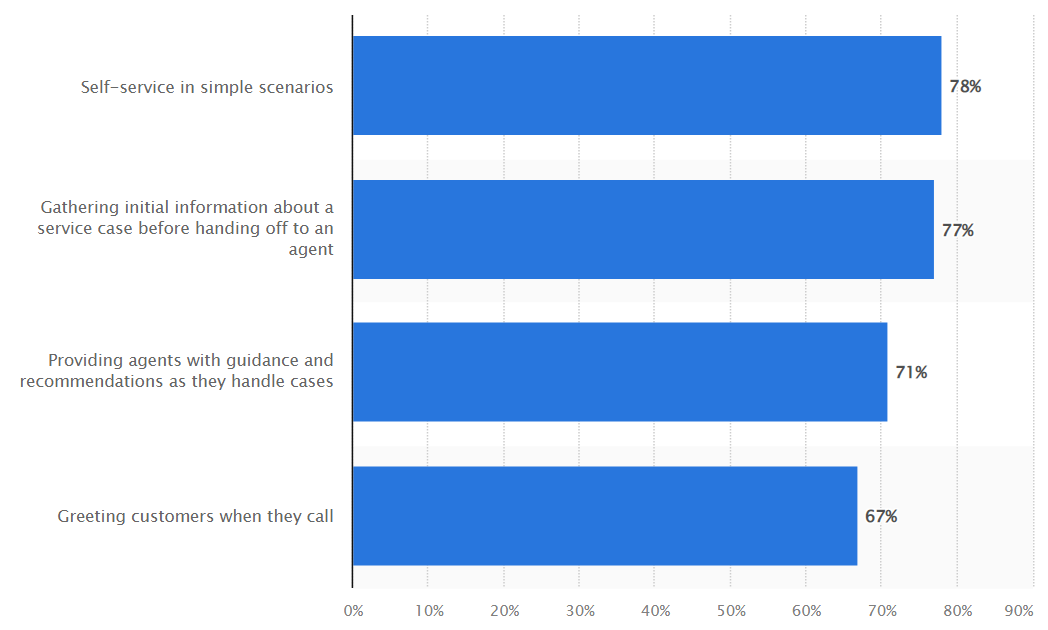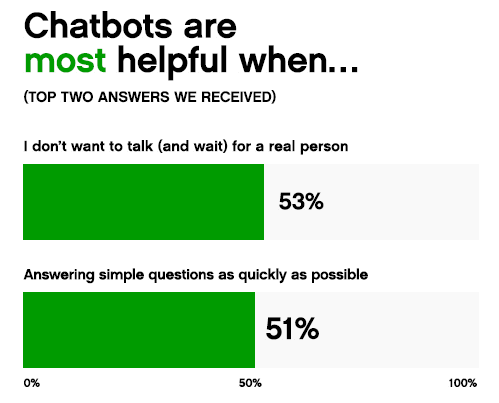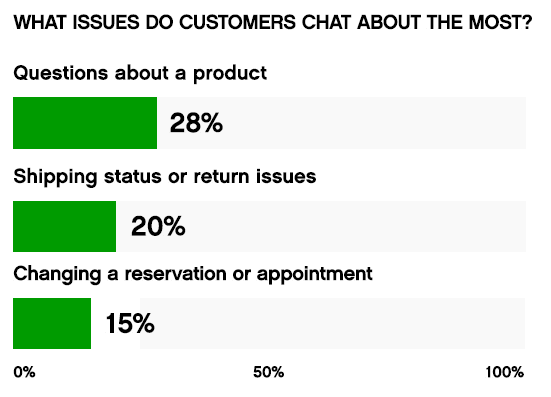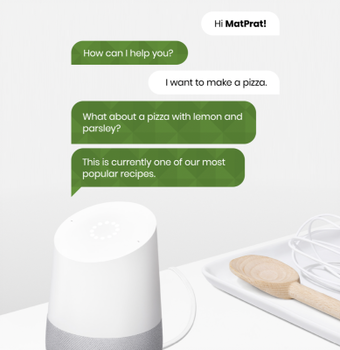According to Juniper Research, businesses can expect $8 billion in cost savings from chatbots by the end of 2022 [1]. Indeed, one of the greatest advantages of chatbots is that they can save time and money. And this is what we want to talk about today. Let’s look into how these intelligent assistants can help you boost your business and generate substantial savings.
Today, there are chatbots everywhere. They are especially popular in e-commerce, but you also find them in the customer service departments of companies like banks and telecoms. Before we get down to business, let’s spend a few moments on the chatbots themselves. What are they, and what are their major advantages?
What is a chatbot?
Generally speaking, a chatbot is a smart assistant based on a chatbox. Instead of a human consultant or employee, there is an AI-powered algorithm on the other side. Technologies such as machine learning and NLP (natural language processing) help the chatbot understand and respond to questions from customers. So yes, we could say that talking to a chatbot means talking to a computer. Today, chatbots are primarily responsible for simple and repetitive tasks. As the technology develops, they will become more natural, accurate and effective.
Many experts predict the advent of so-called super-smart chatbots. Thanks to deep learning – a more advanced and comprehensive version of machine learning – they will soon be a reality. Super-smart chatbots will quickly understand customers and generate coherent, natural responses. They will also help humans execute more advanced and complicated tasks.
CHATBOT APPLICATIONS
Speaking of tasks – what can chatbots be used for? According to data from 2018 (2), chatbots are especially handy in the following situations:

Today, the situation is similar. Chatbots are efficient for:
- Scheduling and rescheduling appointments
- Answering FAQs (frequently asked questions)
- Distributing vouchers and promo codes
- Providing information about new products and promotions
- Onboarding new employees
- Providing assistance in simple rule-based scenarios
In 2021, Gladly.com conducted their annual customer expectations report. In last year’s edition, respondents said that chatbots are useful primarily when they don’t want to wait for a customer service consultant or when they need an answer to a simple question.
Also, take a look at another question Gladly asked their respondents:
These answers indicate that a well-trained algorithm can handle simple conversations. When they do their job well, customers don't have to wait to ask a simple question. On the contrary, they get an immediate response. As people are getting used to chatbots, they're becoming more and more popular.
One last thing to mention is that chatbots are always chat-based, and they understand written text only. If you want to communicate via voice, you need a voicebot. And while they may seem similar, they actually work quite differently. For starters, they need different technologies to operate (TTS – text to speech, for example), but that's a story for another article.
The advantages of chatbots
We’ve already mentioned some of the essential advantages of chatbots, but let’s be more specific. The first thing that comes to mind is that chatbots can generate substantial money and time savings. How is that possible? First of all, you can minimise the waiting time. Chatbots can serve numerous customers simultaneously 24/7 - without the need for customer service consultants or considerable financial resources.
Another important element is that chatbots help you organise work and take less important, mundane tasks off your consultants' shoulders. As a result, your employees can focus on more complicated and strategic matters. The chatbot takes care of questions about opening hours and the delivery status.
The third advantage we want to mention is related to their versatility. You can use chatbots for different purposes and alter their “job descriptions” as the needs in your company change. As we mentioned earlier, chatbots can schedule appointments, provide product recommendations, answer frequent questions and execute tons of other simple tasks. It’s just a matter of the right training.
Chatbots are always on standby; they are never on vacation or sick leave. They operate non-stop, are never tired or annoyed.
Chatbots for different industries
Because of their versatility, chatbots have proved useful in many different industries. They are particularly popular in:
- BFSI (banking, financial services and insurance)
- Healthcare
- IT and telecommunication
- Retail and e-commerce
- Travel and accommodation
- Marketing
- HR
As we have seen, chatbots come in handy in many industries. Let’s see how they can be used in three market sectors:
E-COMMERCE CHATBOTS
E-commerce is one of the sectors that has a lot to gain from chatbots. In e-commerce, chatbots can:
- Rescue abandoned baskets
- Provide information about new products in the inventory
- Distribute promo codes
- Provide personalised product recommendations
- Execute advanced selling techniques like upselling and cross-selling
- Answer questions about payment, delivery and product specifications
MARKETING CHATBOTS
What about marketing? Chatbots can help you execute your marketing strategy by automating communication with current and potential customers. As a result, chatbots are often used in email marketing and affiliate marketing. Through chatbots in marketing, you can:
- Conduct customer surveys
- Provide information about new services
- Invite customers to download a mobile app or to join the VIP club
- Communicate with your affiliates and more
CHATBOTS IN HR
Gathering resumes, candidate selection, scheduling interviews – these are just three of many chatbot applications in modern HR departments. It's a fact that a lot of work in HR is mundane and repetitive. Screening resumes can be timeconsuming and is prone to human error. Bots can analyse thousands of CVs in minutes and provide recruiters with a ready-made list of worthy candidates.
Finally, chatbots are great for onboarding processes. Educating every new employee about the company they've just started working for takes time. Chatbots can easily guide new staff through this process so that HR managers can focus on more urgent issues.
Here's a selection of examples of diverse chatbots in action:
CHATBOTS: EXAMPLES FROM DIFFERENT INDUSTRIES
Food/education: MatPrat We created a chatbot (and a voicebot, for that matter) for a Norwegian organisation called MatPrat. They promote Norwegian farmers and their products. A big part of their mission is to help schools educate their pupils about cooking and related topics through their websites. The chatbot answers food-related questions, including what you can make for dinner based on what you have in the fridge.
Read more about this project in our chatbot case study.
__Travel: WizzAir __
WizzAir is a Hungarian ultra-low-cost airline operating in Europe. In April 2021, they announced the introduction of their new smart assistant Amelia. This chatbot gives customers flight and travel information. You can see Amelia in action on their Facebook page or talk to Amelia here.
__Healthcare: WHO __
In late 2021, WHO published information about their new chatbot for women’s health (3). The first set of messages to be included relates to breast cancer, but the project will probably be extended to other diseases. They’ve also built another chatbot that will combat covid-related misinformation. The service is available in several languages and can be accessed via WHO's Facebook page.
How exactly can a chatbot save your company money?
According to Grand View Research, the chatbot market is expected to expand at a CAGR of almost 25% and will reach $2,485.7 million by 2028 (4). This is simply because the technology is effective and helps companies save a lot of time and money.
HR Reporter has shown that 83% of IT, business and financial professionals already use AI-based technologies, including chatbots, on a daily basis. Respondents (69%) say that their productivity increased substantially with the use of these tools. (5)
We could say that chatbots save money because they allow companies to:
- Hire fewer people to get the work done
- Spend less time on mundane and repetitive tasks
- Minimise the resources needed to introduce new services (for example operating 24/7)
Moreover, your employees can work more effectively and focus on the most pressing and important matters. As a result, they can get more done because they don’t waste time on unproductive activities.
According to the already cited report, chatbots can save up to $0.70 per customer interaction. In many companies, this means thousands of dollars saved each month.
If you’d like to find out more about chatbots, we're at your service. Book a free consultation and tell us about your idea. Perhaps we can help you implement a chatbot or voicebot that will automate customer service in your company?
References
- Chatbot Conversations to deliver $8 billion in Cost savings by 2022
- Chatbot market - growth, trends, COVID-19 impact, and forecasts (2022-2017)
- WHO launches women’s health chatbot with messaging on breast cancer
- Chatbot Market Size Worth $2,485.7 Million By 2028
- AI, chatbots and mobile apps prove popular with professionals
Author
Related articles
![A well-crafted prompt doesn’t just work once. It works across teams, channels, and campaigns. It can be tweaked for new use cases and refined based on what performs best.]()
June 27, 2025 / 4 min read
Prompts are marketing assets: how to reuse, and scale them
Prompts aren’t throwaway lines. They’re repeatable, scalable assets that can streamline your marketing your team’s output. Learn how to build a prompt library that delivers.
![Woman using a wheelchair in the office settings]()
June 17, 2025 / 5 min read
What is accessibility and why it matters?
Accessibility ensures everyone — including those with disabilities or limitations — can read, navigate, and engage with your content equally.







